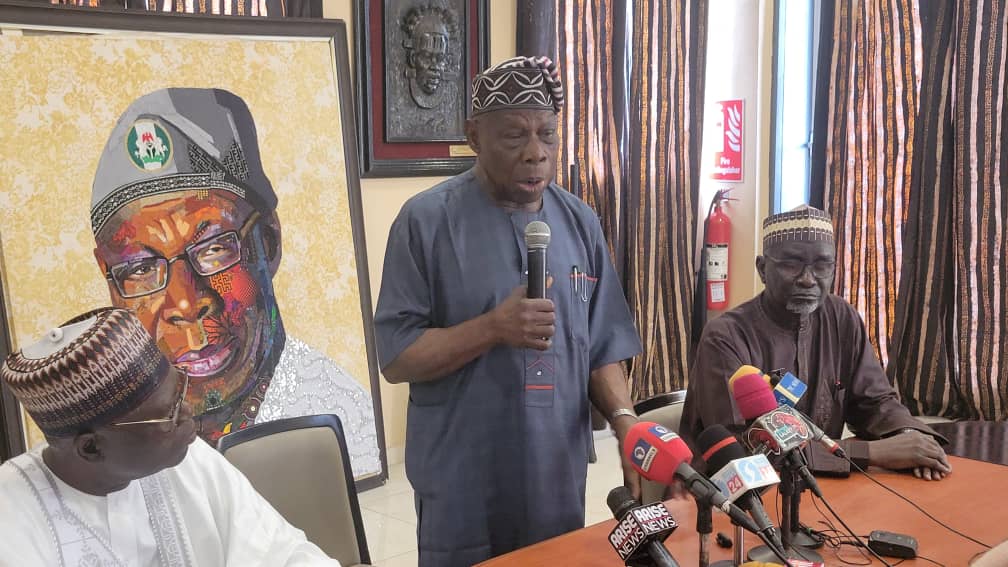Daud Olatunji
Former President Olusegun Obasanjo has stated that every region in Nigeria has, at one time or another, planned secession, challenging the notion that Igbos should be singled out and punished for Biafra’s attempted secession.
He argued that the foundational problem plaguing Nigeria is regionalism, which has continually fostered division and hindered national unity.
Obasanjo made these remarks on Tuesday while hosting members of the League of Northern Democrats, led by former Kano State Governor, Ibrahim Shekarau, at the Olusegun Obasanjo Presidential Library in Abeokuta, Ogun State.
The meeting, which began with a closed-door session between Obasanjo and Shekarau, later extended to a broader discussion with the league members.
Reflecting on Nigeria’s past, Obasanjo asserted that no ethnic group should be punished for secessionist tendencies, as every part of the country had, at some point, contemplated breaking away.
He particularly criticized the idea of excluding Igbos from the presidency because of the Biafra civil war, describing it as unfair and misguided.
He referenced the North’s “Araba” movement, aimed at secession during the country’s early years,saying, “what is ‘Araba’ in the North?”
Obasanjo emphasised that the North had also considered breaking up Nigeria, just as the Igbos did with Biafra.
He said the North might have broken away from Nigeria if not for the advice of the erstwhile president of Cameroon, Ahmadou Ahidjo, who governed between 1966 and 1989.
He said Ahijo warned the northern leaders then, against carrying out their threat to break away from Nigeria.
He said “I think all of us in Nigeria have to rethink,it bleeds my heart when people say because the Igbos had carried out secession, an Igbo man cannot be the president of Nigeria. I say what nonsense?
“There is no section of Nigeria that has not planned secession. What is ‘Araba’ in the North? The North planned to break up Nigeria. What is the treasonable felony? So, who among us can say I am better than the other? None!”
He argued that Nigeria was one of the few African countries that gained independence with multiple regional leaders, a legacy that continues to hinder national unity.
Reflecting on Nigeria’s complex history, Obasanjo said, “At independence, we had three leaders. So, we attained independence with putting three countries in one, and that has remained part of our problem for a long time.”
He warned that regionalism continues to pose a significant threat to the country’s cohesion, noting that whenever the rhetoric of North, West, and East arises, he feels “frightened.
Obasanjo urged Nigerians to prioritize national identity over ethnic affiliations, stating that his Yoruba heritage should not be a hindrance to his loyalty to Nigeria.
“I am a Yoruba man, and I’m proud to be a Yoruba man, but my being Nigerian should not be the enemy of my being a Yoruba man. Neither should my being a Yoruba man be the enemy of my being a Nigerian.”
He further called for a rethinking of leadership selection based on merit rather than regional or ethnic considerations, insisting that the best candidate should lead the country regardless of their background.
“If we do not get the best man for the job, it doesn’t matter where he comes from, we are deceiving ourselves.”
Expressing disappointment with Nigeria’s failure to meet its potential, Obasanjo lamented that the country had let down not only its citizens but also Africa and the black race globally.
He referenced Nigeria’s previous influence during the fight against colonialism and apartheid, noting that the country once commanded respect on the global stage, but has since lost that standing.
“We have disappointed ourselves, we have disappointed Africa, we have disappointed the black race, and we have disappointed the world.
“ That is the truth,” Obasanjo said, warning that the world is aware of Nigeria’s struggles, even if Nigerians themselves refuse to acknowledge them.
Calling for a renewed sense of unity, Obasanjo reiterated that Nigeria’s future depends on collective efforts to transcend ethnic and regional divisions.
He said, “Nigeria is greater than anyone of us or part of Nigeria. We should see Nigeria in the holistic form that it should be.”
He admitted that mistakes had been made in the past, including during his own tenure, but emphasised the importance of learning from those mistakes to build a stronger, more unified country.
Obasanjo called for a more inclusive approach to leadership, expressing his readiness to support efforts that align with national interests over regional or ethnic agendas.
“When you are a National League, I will receive you warmly, I will join you warmly, and I will be your patron if I cannot be active because I’m getting old.”
Earlier, Shekarau said the newly formed group represents individuals from Northern Nigeria, cutting across various political affiliations, who are concerned about the state of governance in the country
He stressed that the group’s core mission is to advocate righteousness in politics and governance.
He emphasized the urgent need for unity, credible leadership, and righteousness in Nigerian politics.
He said “this group, made up of ladies and gentlemen from all walks of life, emerged approximately three months ago,” Shekarau said, noting that the formation followed extensive consultations and discussions.
He highlighted that the group’s goal is to contribute to the nation’s development, not just within the Northern region but across the entire federation.
The former governor emphasized that the initiative is non-partisan, with representation from almost all registered political parties in Nigeria.
“It is not necessarily about political parties, it is about our existence as a nation regardless of our political leanings,” he said.
The group’s vision, according to Shekarau, is centered on mobilizing and enlightening citizens to work together towards the common good, irrespective of their political affiliations.
“The sum total of our vision is to advocate righteousness in politics, in governance, and our oneness as a nation,” he said, drawing on the famous lines from Chinua Achebe’s Things Fall Apart: “When things fall apart, the center cannot hold.”
While the group has a Northern base, Shekarau explained that their focus is on national unity.
He expressed the belief that if the North, as the largest and most populous region in Nigeria, could unite and work towards collective development, it would significantly contribute to the overall progress of the country.
“Nigeria is potentially great, and we want to play our part in ensuring the attainment of that greatness,” Shekarau said.
The former governor outlined the key challenges facing the nation, particularly in the Northern region.
These include insecurity, disunity, education, unemployment, and youth restiveness.
He emphasized the importance of addressing these issues through wealth creation and fostering an improved democratic process.
“We hope to influence political decisions and the process of recruiting leaders in our country at all levels.
“The issue of credibility, righteousness in leadership, and even in followership has been a major challenge for all of us,”he said.
Do you want to share a story with us? Do you want to advertise with us? Do you need publicity for a product, service, or event? Contact us on WhatsApp +2348183319097 Email: platformtimes@gmail.com
We are committed to impactful investigative journalism for human interest and social justice. Your donation will help us tell more stories. Kindly donate any amount HERE






